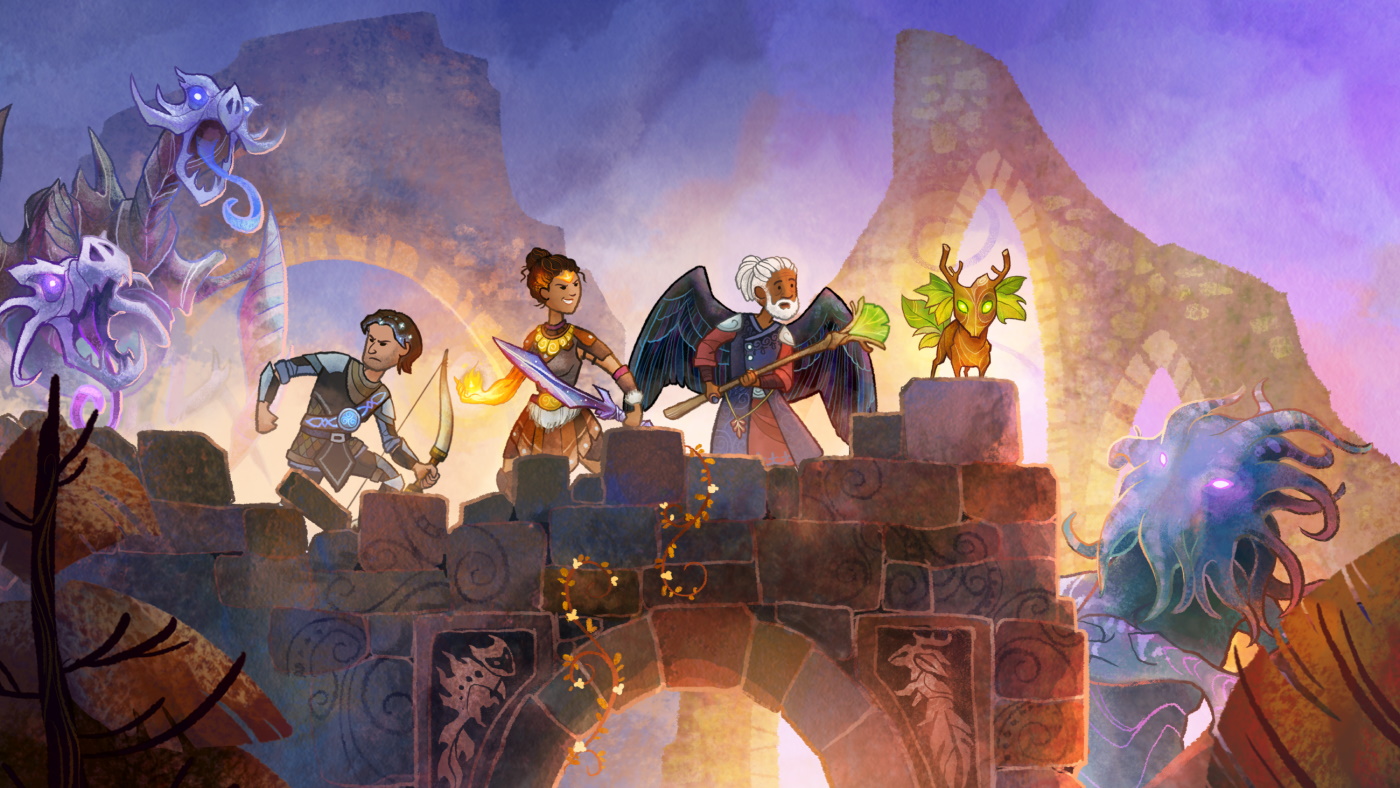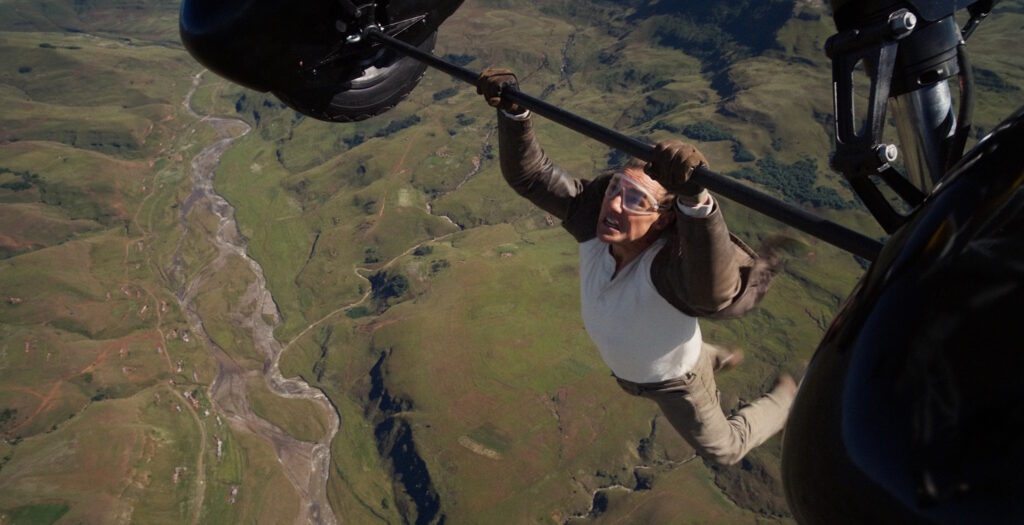[Note: This article was originally published at Cinema St. Louis’ The Lens.]
Worldwalker Games’ tactical storytelling game Wildermyth is the kind of charming and addictive genre hybrid that often makes a splash in the indie gaming world. It rather inventively picks and
chooses elements from several different game genres, which can make it a bit bewildering to first sink your teeth into its otherwise familiar fantasy components. In the broadest sense, Wildermyth is
a tactical role-playing game in the mold of Fire Emblem, XCOM,and The Banner Saga, although its gameplay also owes a significant debt to traditional pen-and-paper RPGs, particularly the more recent editions of Dungeons & Dragons. You command of a party of adventurers who journey through a medieval-ish world of magic, slaying monsters in turn-based battles that follow straightforward rules and play out on a grid. There are classes, levels, and most of the usual hallmarks of the genre.
However, this nickel summary doesn’t really convey all the key elaborations in Wildermyth’s distinctive, fusion-style gameplay. The world that your party explores resembles a digital board game, where the spaces represent different wilderness regions with their own resources and hazards. The game also seems to draw some influence from life-simulation games like The Sims. Characters age over time, and some of them nurture romances, foster rivalries,and even have children. Adventurers also possess personality attributes (e.g., “bookish”, “hothead”, “greedy”) that can affect relationships and encounters. As in a visual novel, Wildermyth places a strong emphasis on narrative, connecting its various phases with winsome comic panels that turn each play-through (or “story”) into a saga of flowery prose, thrilling danger, and wry humor.
Perhaps most crucially, Wildermyth is built on a foundation of both randomness and permanence, much like a roguelike dungeoncrawler. This is discernible not only in the invisible die-rolls that
occur behind the scenes, but in virtually every component of the story. The enemies, events, treasures, world map, and tactical terrain are all procedurally generated. Consequently, each roughly two-or-three-hour Wildermyth story feels unique, with its own emergent idiosyncrasies and dramatic landmarks. When combined with the game’s inexorable forward momentum – the days,
months, and years are always rushing by for your very mortal adventurers – this randomness instills each decision point with a gnawing urgency and tension. Every day spent journeying to investigate a ruin (hoping that it will yield treasure or magic) is a day that could be spent recruiting a helpful ally, crafting new armor, or heading off the monster incursion that is currently rampaging its way across the map. What’s more, the game’s foes become more powerful over time, acquiring new abilities and a deeper, more diverse bench of denizens from which to draw. While your characters also advance in terms of their skills and equipment, they are concurrently inching towards their inevitable decline and retirement.
For these reasons, Wildermyth can be maddening experience for meticulous players who are accustomed to more traditional RPGs. You know the type: The kind of gamers who will happily spend 60-plus hours exploring every inch of the map, recovering every coin of treasure, and grinding experience and equipment until their characters are unstoppable demi-gods. (Full disclosure: Yours truly is that kind of gamer.) In a sense, Wildermyth is the antithesis of the AAA open-world RPG. It is impossible to do everything in a single story, due to both its random nature and its relentlessly ticking clock. There are no online guides that provide step-by-step instructions for how to achieve perfection in the game. (The best resource one is likely to find is the Worldwalker-hosted Wildermyth Wiki, which helpfully explains the immediate outcome when a player makes a particular choice during a random event or encounter.) A veteran Wildermyth player is not someone who has memorized the games’ thousands of possible permutations – no one could – but rather someone who can roll with the punches and turn random opportunities (and disasters) to their advantage.
Like most RPG heroes, Wildermyth characters gain experience after battles, unlocking a selection of random special abilities appropriate for their class. A canny player can nudge a character
along a certain development path – turning a novice hunter into a lethal archer, for example, by picking skills that maximize their damage with a bow. Yet Wildermyth has a habit of throwing a
wrench into even the most rudimentary long-term planning. One of the key features of the game is transformations: magical events that bestow a character with a permanent ability such as avian
wings, fire attacks, or a mystical familiar. However, the character selected for a potential transformation is random, as is the exact power that they receive. You can always walk away from a
transformation opportunity, but given that the tiniest edge can often make the difference in the game’s tactical combat, it’s usually foolish to do so.
Sometimes, a transformation lines up with the existing strengths a character has been developing. A mystic who is already a solid ranged damage-dealer can become a living artillery weapon when
infused with lightning magic, especially if that transformation later advances to a more powerful state. Often, however, these various magical changes don’t work out quite so ideally. That master
archer you’ve been cultivating can get sidelined into a mixed melee-ranged fighter by a transformation that grants them a wolf’s bite and claw attacks. Whether this unexpected development derails your entire story or instead becomes a potent advantage is a matter of player perspective and resourcefulness. Speaking as a gamer who doesn’t like unforeseen complications, it can be frustrating to deal with such incidents where you only have limited control over the outcome (at best). Once you attune yourself to Wildermyth’s distinctive brand of narrative disarray, however, the experience can be surprisingly rewarding. Even for the inveterate control freak, there is a thrill in not knowing exactly what lies over the next hill – perhaps a ravenous gorgon looking for a snack, or perhaps a peaceful, starlit glade where two characters might make a connection.
Accepting randomness also means being comfortable with defeat. It’s often difficult to discern if a loss occurred as a result of ordinary bad luck, or due to the butterfly-effect fallout of some seemingly minor choice made countless turns ago. Sometimes Wildermyth’s chaotic spikiness can bite you, hard, right out of the gate. Suffer a few unfortunate rolls of the dice during your first battle, and your entire party of greenhorns can be wiped out before their story has even begun. When such ignominious defeats occur, you can only dust yourself off and start again with a fresh roster of heroes. The game’s difficulty can be punishing even at moderate levels, but that challenge derives as much from happenstance as it does from enemy power. A single freak mishap is much more devastating at higher game difficulties, as effects cascade and the story quickly hurtles out of control through a brutal negative feedback loop. Losing a character in battle doesn’t necessarily result in an immediate disaster – they either withdraw and suffer a permanent penalty or go out fighting in a blaze of glory – but while you spend precious time licking your wounds and replacing the fallen hero with a new (and less experienced) recruit, the world’s monsters can quickly seize the upper hand.
However, the game’s black box of hidden probabilities is not the most pivotal factor in determining the path of a Wildermyth playthrough. Ultimately, it is the decisions that the player makes at both
the macro and micro level that end up guiding the story along its winding route. The catch is that Wildermyth’s systems are sufficiently complex and stochastic that accurately predicting longterm
outcomes is effectively impossible. This can feel refreshingly novel in a gaming landscape where even the most convoluted RPG storytelling systems – Bioware’s Dragon Age series leaps to mind – can be navigated to achieve specific results with the aid of a detailed online guide. In Wildermyth, you make your choices, but you’ll never know if they are the right ones (to paraphrase The Witcher).
When combined with the game’s more character-driven elements, this resistance to all but the most elementary, short-term theorycrafting gives Wildermyth a glint of real-world pathos. This might be surprising given the game’s cutesy, paper-cutout design aesthetic. However, just as in a great tabletop D&D campaign, guiding characters through struggles and victories creates investment – even when those characters start out as a collection of numbers. Wildermyth’s heroes often interact in ways that are partially out of the player’s control. They can fall in love with one another and have children, who can then join their aging parents as a new cohort of young adventurers. In between story chapters, heroes can have off-screen adventurers that are only tantalizingly hinted at in the game’s comic interludes. Unusual personality interactions can lead to intra-party friction and unique decision points. And, of course, nothing can stop the march of time: Every hero who survives to the end of a story grows gray and wrinkled, and must eventually hang up their sword or staff. Retirees can later begin anew as “Legacy” heroes – new characters with a few bonus abilities from their mythic namesakes – but the original adventurers depart to the pages of history, never to return.
These elements bestow Wildermyth’s characters with a surprising sense of life. There is a hint of humanity observable in the way that they bumble through their relatively short lifespans, making
choices that may be unwise in hindsight, but always struggling to do their best under the circumstances. This dynamic contributes to a striking emotional realism in a game that otherwise has no use for immersive fantasy verisimilitude. A mighty warrior falling to a lucky blow from a lizard-folk spearman would be a frustrating but minor setback in most RPGs. In Wildermyth such a death can feel like a tragedy, particularly if the warrior’s adventuring companions include their romantic partner or their children. A player can always reload from a saved game and try again, but there’s nonetheless something wrenching about any hero’s sudden demise, as it rarely fits some grandiose narrative of noble sacrifice. Magic may be real in this world, but there is no spell that will resurrect the dead. The warrior’s companions can only mourn, and then make the tough decision to either hastily bury their friend on a lonely hillside or return their remains to their ancestral home. And no matter what they decide, the enemy will be using that time to gather their strength.
Wildermyth is now available for Windows and MacOS from Steam.




